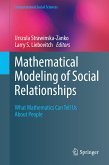The book contains a practical framework to study the factors influencing echo chambers and polarization formation occurring in social media communication. By modeling individual social media users' information consumption, the influence of various behaviors and policies are captured as macro-phenomena. The book also introduces a comprehensive agent-based reinterpretation of the Zaller model, a classic in public opinion research. In addition, the book demonstrates two real-life applications of the model using empirical observations: resolving the conflicting observations of the online echo chamber effect, and modeling the influence of vaccine-related Facebook pages on users' opinions about vaccination.
Dieser Download kann aus rechtlichen Gründen nur mit Rechnungsadresse in A, B, BG, CY, CZ, D, DK, EW, E, FIN, F, GR, HR, H, IRL, I, LT, L, LR, M, NL, PL, P, R, S, SLO, SK ausgeliefert werden.









